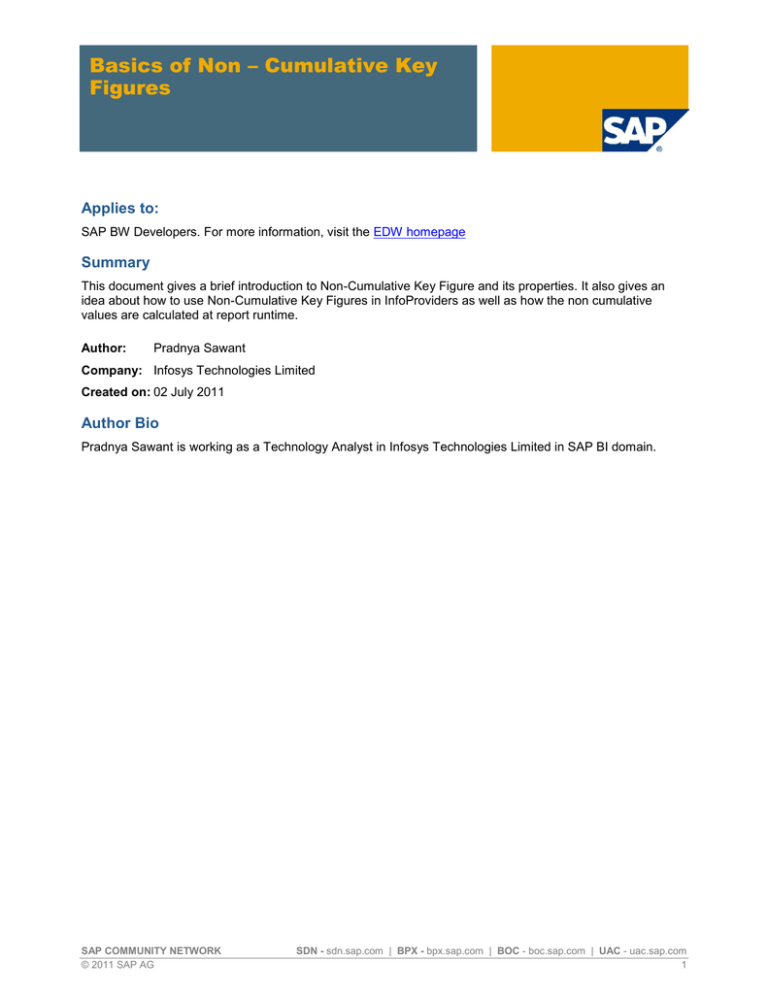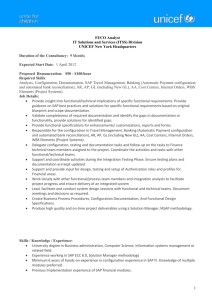Basics of Non Cumulative Key Figures
advertisement

Basics of Non – Cumulative Key Figures Applies to: SAP BW Developers. For more information, visit the EDW homepage Summary This document gives a brief introduction to Non-Cumulative Key Figure and its properties. It also gives an idea about how to use Non-Cumulative Key Figures in InfoProviders as well as how the non cumulative values are calculated at report runtime. Author: Pradnya Sawant Company: Infosys Technologies Limited Created on: 02 July 2011 Author Bio Pradnya Sawant is working as a Technology Analyst in Infosys Technologies Limited in SAP BI domain. SAP COMMUNITY NETWORK © 2011 SAP AG SDN - sdn.sap.com | BPX - bpx.sap.com | BOC - boc.sap.com | UAC - uac.sap.com 1 Basics of Non – Cumulative Key Figures Table of Contents Definition: ............................................................................................................................................................ 3 Scenario: ............................................................................................................................................................. 3 Creating Non-Cumulative Key Figure ................................................................................................................. 3 Creating Non-Cumulative InfoCube .................................................................................................................... 5 Creating Transformations ................................................................................................................................... 6 Data Analysis: ..................................................................................................................................................... 6 Related Content .................................................................................................................................................. 8 Disclaimer and Liability Notice ............................................................................................................................ 9 SAP COMMUNITY NETWORK © 2011 SAP AG SDN - sdn.sap.com | BPX - bpx.sap.com | BOC - boc.sap.com | UAC - uac.sap.com 2 Basics of Non – Cumulative Key Figures Definition: As name suggests a “Non-Cumulative key figure” is a Non Aggregating field which will not be cumulative depending on some characteristic values, instead it is considered with reference to time. The non cumulative key figures are used in Inventory management or Banking application where users are interested to know the stock or Account balance information as of date. For Example Gross sales on Day 1 = 100 $ on day 2 it is 200$ and day 3, it is 150$. So the total net sales for 3 days is 450$. But if the stock of a particular product on day 1 is 50 L, on day 2 it is 45 L and Day 3 it is 35 L, This does not signify the stock for last 3 days 130L. User will be interested in knowing the stock available on each day and not the cumulative value for all 3 days. Scenario: Let‟s consider a scenario which will help to understand the use of Non-Cumulative Key figures. • In a banking application we need to provide Account Balance and Transactions done on a particular date done by the customer. Account balance = Balance on previous day + Amount Deposited – Amount Withdrawn on current day. • Transactions will not be done on each day. But we need to have the details of Account Balance for each day irrespective of whether any transactions have been done or not. • By using Non Cumulative Key Figures, we can store only Delta records (Records for the days on which any transaction has been done) in the Cube and we can get the details of Account Balance even on intermediate dates. • Let‟s understand how this can be achieved. Creating Non-Cumulative Key Figure Let‟s create a non- cumulative Key Figure Z8_BAL2 (Total Account Balance). It is created in the same manner as the normal cumulative key figure. The Non Cumulative nature of the InfoObject can be defined under Aggregation Tab by selecting any one of the below option (Difference has been explained later): NCum value with NCum value change Ncum value with in- and out- flow Let‟s select Ncum value with in- and out- flow. Key figure Z8_DEP (Amount Deposited) has been given as Inflow value and Z8_WITHDR (Amount Withdrawn) as Outflow Value. Key Figures Amount Deposited and Amount Withdrawn are the cumulative key figures having same data type as Total Account Balance. Non-cumulative key figures always have summation as standard aggregation. The standard aggregation specifies how this key figure is compressed using characteristics other than time characteristics whereas the exception aggregation Specifies how this is compressed using all time characteristics. SAP COMMUNITY NETWORK © 2011 SAP AG SDN - sdn.sap.com | BPX - bpx.sap.com | BOC - boc.sap.com | UAC - uac.sap.com 3 Basics of Non – Cumulative Key Figures Let‟s set Exception Aggregation as Last Value. Query output varies with different Exception Aggregation Different Exception Aggregations available. SAP COMMUNITY NETWORK © 2011 SAP AG SDN - sdn.sap.com | BPX - bpx.sap.com | BOC - boc.sap.com | UAC - uac.sap.com 4 Basics of Non – Cumulative Key Figures Creating Non-Cumulative InfoCube Let‟s create an InfoCube and include Non-Cumulative key figure in it. You can add Non Cumulative key figure as any other normal Key figure. As we add Non Cumulative Key Figure Z8_BAL2; Cumulative Key Figures Z8_DEP and Z8_WITHDR defined as Inflow and Outflow respectively also got added automatically (as shown in below screenshot). We have also included 0CALDAY as the time characteristics (for Exception Aggregation). In order to analyze the non-cumulative values, you need to define for which time interval you want to calculate the non-cumulative. Otherwise, minimum and maximum loaded values of the time reference characteristic are used. All validity areas for a non-cumulative InfoCube are stored in a validity table. this automatically contains the most detailed, selected time characteristic of the InfoCube as the time-reference characteristic To set the validity area goes to Extras Maintain non-cumulative values and select characteristics of Validity Table. We have selected Account No and 0CALDAY (selected by system as the most detailed time ) SAP COMMUNITY NETWORK © 2011 SAP AG SDN - sdn.sap.com | BPX - bpx.sap.com | BOC - boc.sap.com | UAC - uac.sap.com 5 Basics of Non – Cumulative Key Figures Creating Transformations While creating the Transformations Non Cumulative Key figure will not be available. Key figures given as Inflow and Outflow will be present. We need to include the same in underline DataSource. Make the appropriate mapping and Load the data. For Key figures set proper currency in Rule Details, otherwise will lead to errors while activation of Transformations. Data Analysis: Data in InfoCube: • • • • • • As shown in above screenshot, InfoCube contains the account details of two Customers with Account No AC1000 and AC1001. Fields Amount Deposited and Amount Withdrawn have been displayed but the Non-Cumulative Key Figure Total Account Balance is not available in the cube. From above screenshot, it is clear that InfoCube contains records on which some transaction has been done. For AC1000, Transactions have been done on 2nd, 4th and 6th May and for AC1001 transactions have been made on 2nd and 6th May. If a customer say Sahil Sharma wants to know his Account Balance on 5th May 2008.No record exists in InfoCube for 5th May. Let‟s create a query on this InfoCube and analyze the report. SAP COMMUNITY NETWORK © 2011 SAP AG SDN - sdn.sap.com | BPX - bpx.sap.com | BOC - boc.sap.com | UAC - uac.sap.com 6 Basics of Non – Cumulative Key Figures Query: As shown in below screenshot a query has been created to get the data for Non-Cumulative key Figure Total Account balance along with its Inflow and Outflow values. Query Output: • • • • • • As shown in above screenshot Initial value for account Balance of both the customers have been set to zero. After that for a particular Account no. the days on which Transaction has been made , The Inflow value i.e. Account Deposited has been added to the previous value and Outflow value i.e. Amount Withdrawn has been subtracted (as the name suggests)to calculate Total Account Balance(Displays its Last Value). As on 2nd May, both the accounts have been updated and on 4th May AC1000 has been updated. On 05/02/2008, Total Account Balance for AC1000 has been calculated as 0+10000-5000 = 5000. The days on which no transaction has been done e.g. 05/5/2008 [No record exists in Infocube]; Total Account Balance holds its previous value. As stated in the scenario, Using Non- Cumulative Key Figure we have stored only delta records in the cube but manage to get the details even on intermediate dates (dates between two transactions). Note: If we select the option „NCum value with NCum value change‟, we need to provide one cumulative Key figure as Non-Cumulative value change. During execution of the query the value of the Non-Cumulative Key Figure is calculated by considering Non Cumulative value change as the Delta change to the previous value. As in the case „Ncum value with in- and out- flow‟ difference between inflow and outflow has been considered as delta change. SAP COMMUNITY NETWORK © 2011 SAP AG SDN - sdn.sap.com | BPX - bpx.sap.com | BOC - boc.sap.com | UAC - uac.sap.com 7 Basics of Non – Cumulative Key Figures Related Content http://help.sap.com/ http://www.sdn.sap.com/irj/sdn service.sap.com For more information, visit the EDW homepage SAP COMMUNITY NETWORK © 2011 SAP AG SDN - sdn.sap.com | BPX - bpx.sap.com | BOC - boc.sap.com | UAC - uac.sap.com 8 Basics of Non – Cumulative Key Figures Disclaimer and Liability Notice This document may discuss sample coding or other information that does not include SAP official interfaces and therefore is not supported by SAP. Changes made based on this information are not supported and can be overwritten during an upgrade. SAP will not be held liable for any damages caused by using or misusing the information, code or methods suggested in this document, and anyone using these methods does so at his/her own risk. SAP offers no guarantees and assumes no responsibility or liability of any type with respect to the content of this technical article or code sample, including any liability resulting from incompatibility between the content within this document and the materials and services offered by SAP. You agree that you will not hold, or seek to hold, SAP responsible or liable with respect to the content of this document. SAP COMMUNITY NETWORK © 2011 SAP AG SDN - sdn.sap.com | BPX - bpx.sap.com | BOC - boc.sap.com | UAC - uac.sap.com 9


